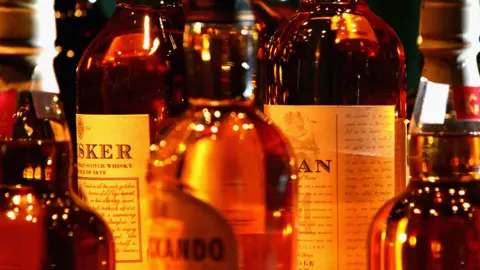Scotch whisky exports slump to 'lowest in a decade'
 Getty Images
Getty ImagesGlobal exports of Scotch whisky slumped to their lowest level in a decade last year, according to an industry body.
The Scotch Whisky Association (SWA) said exports fell by more than £1.1bn as Covid-19 and a 25% tariff in the United States hit distillers hard.
In 2020, Scotch whisky exports fell 23% by value to £3.8bn.
SWA found the value and volume of exports to most of Scotch whisky's top 10 markets fell as countries went into lockdown to combat the spread of Covid.
The closure of hospitality and travel restrictions hit airport retail globally, with export values falling in 70% of Scotch whisky's global markets, compared with 2019.
Scotch whisky's most valuable market, the US, registered the most significant losses as a result of tariffs imposed on single malts by the US in retaliation against EU subsidies given to aircraft maker Airbus.
In 2020, exports to the US fell by 32% to £729m, a loss of £340m compared with the previous year.
Exports to the EU, the industry's largest regional export market, fell by 15%.
'Grim reminder'
SWA chief executive Karen Betts said: "These figures are a grim reminder of the challenges faced by distillers over the past year, as exports stalled in the face of the coronavirus pandemic and US tariffs.
"In effect, the industry lost 10 years of growth in 2020 and it's going to take some time to build back to a position of strength."
Ms Betts said Scotch whisky was now "losing considerable ground" in the US as a result of tariffs imposed there as a result of the EU-US trade dispute.
"The Scotch whisky industry has now paid over half a billion pounds in tariffs - which are a form of tax - on behalf of the UK government because of the subsidies that the government granted to the aerospace sector in breach of World Trade Organisation rules," she said.
"So we are calling on the chancellor to support Scotch whisky distillers by reducing our tax bill in the UK."
'Unfair tariffs'
The UK government responded by saying it had pushed the issue of tariffs "incredibly hard" with the previous US administration, and "will be engaging the new administration as soon as possible to get these unfair tariffs lifted".
A spokesman said: "We have a clear strategy in place to de-escalate the dispute and come to a negotiated settlement that works for all parties.
"Ultimately, we want to draw a line under this so we can move our trading relationship with the US forward and deepen our trading relationship, to the benefit of UK businesses.
"Our decision to suspend Boeing tariffs helped us swerve additional US tariffs on goods like blended whisky when other European countries were targeted, and has shown the US we are serious about resolving the dispute.
"We reserve the right to re-impose tariffs if a satisfactory negotiated settlement isn't reached."
 Getty Images
Getty ImagesMeanwhile, Pernod Ricard's Scotch whisky business reported "a measured return" to its "pre-pandemic momentum" in the half-year to December.
Chivas Brothers said that although total sales were down by 10% compared with the same period in 2019, they were 17 percentage points up on the previous six months when Covid restrictions first hit.
The drinks giant, whose brands include Chivas Regal, Ballantine's, Royal Salute and The Glenlivet, reported 2% growth in worldwide domestic business sales, despite continued on-trade restrictions.
Sales were particularly strong in Eastern Europe, which grew by 10%, driven by Russia and Poland.
Double-digit growth was also recorded in China, Taiwan and South Korea where lockdown restrictions have been eased.
North America sales were up by 2%, bolstered by strong sales of The Glenlivet in the US.
In the travel retail category, sales slumped by 16%.
'Rebounding quickly'
Chivas Brothers chairman and chief executive Jean-Christophe Coutures said: "I'm encouraged by how quickly we are rebounding in markets where lockdown restrictions have lifted.
"Travel retail will continue to be a challenge this year, but our domestic market performance - even in countries with on-trade restrictions - demonstrates the strength of our brands and the versatility of Scotch as a multi-occasion drink.
"We must build on this momentum by clearing the path for Scotch to fully rebound and recover, and that means bringing about a swift end to US tariffs, prioritising Scotch in post-Brexit trade negotiations and a cut in spirits duty in the next budget."
